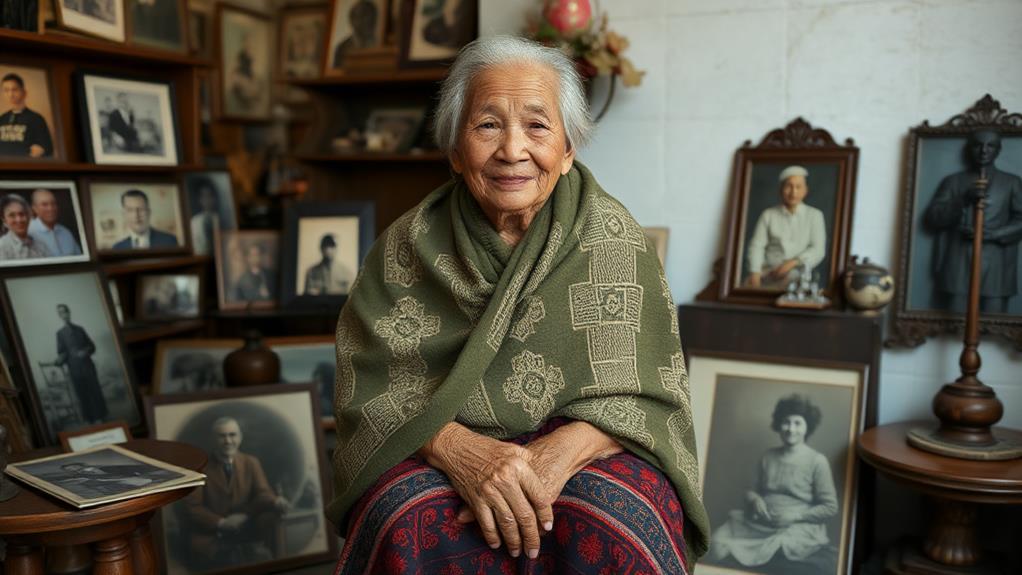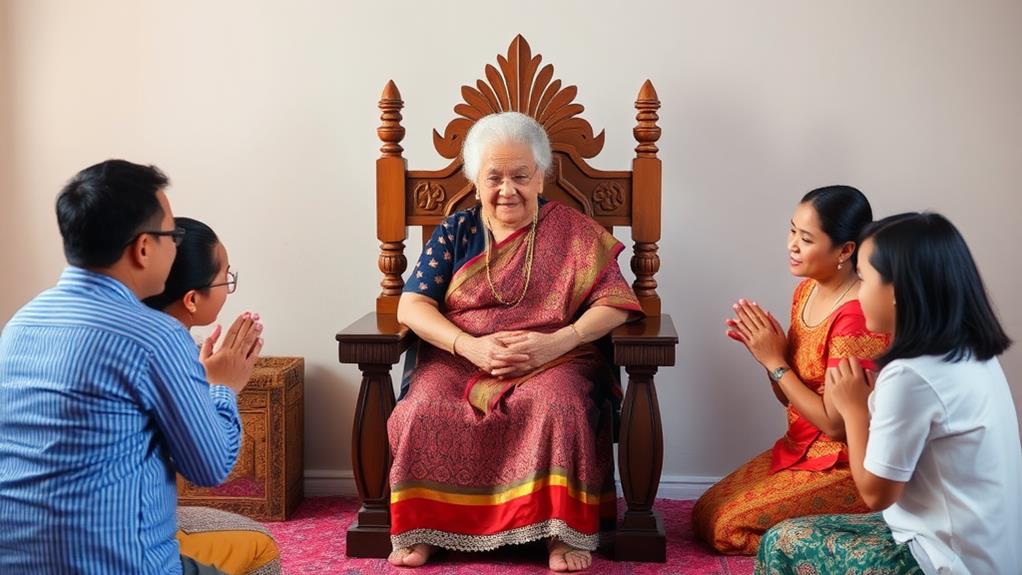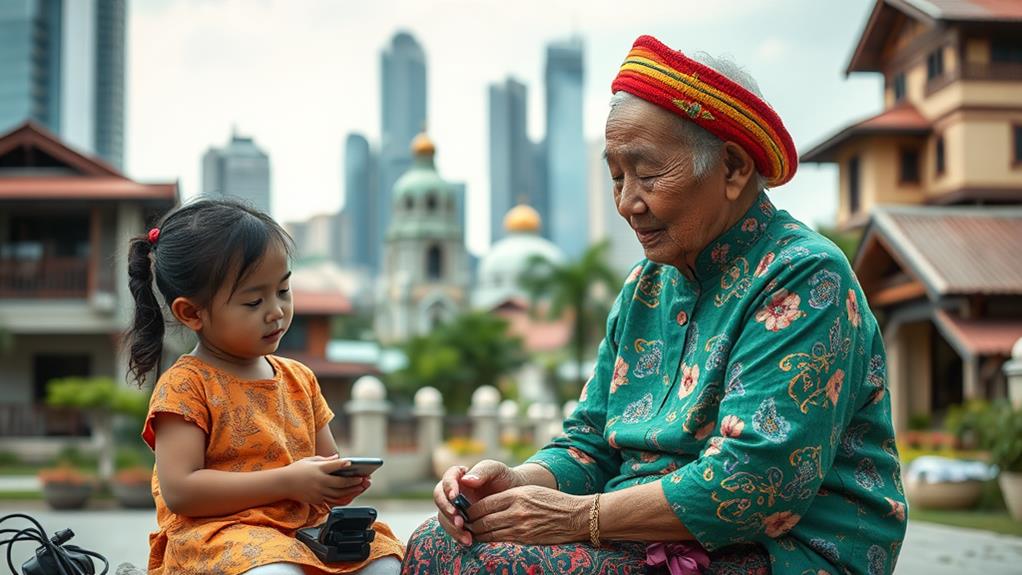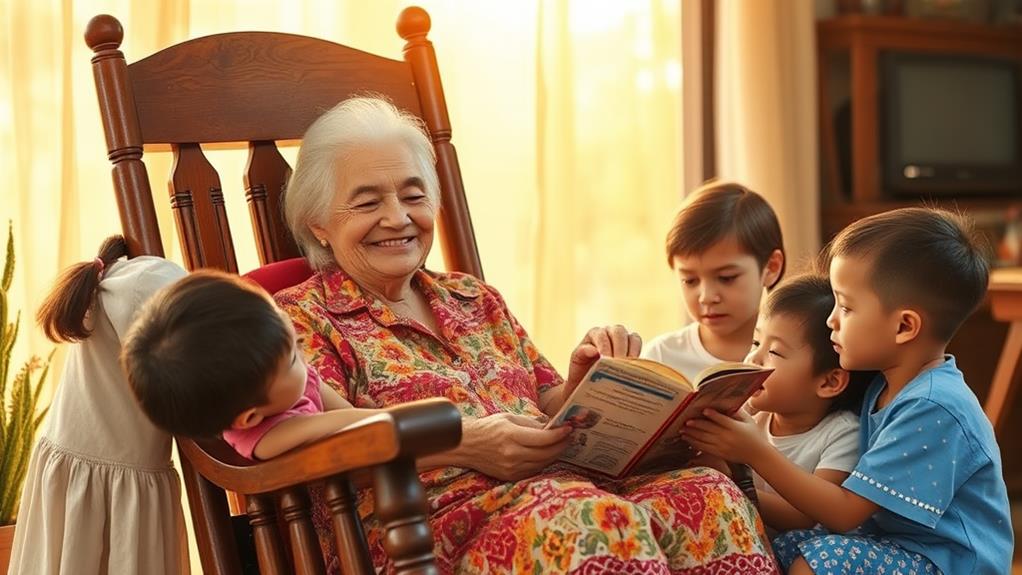Respect for Elders is a Core Filipino Value
Respect for elders is a deeply ingrained value in Filipino culture, shaping daily life, traditions, and social interactions. This value is demonstrated through gestures like pagmamano, which symbolize deference and honor.
Elders are Revered in Filipino Families
In Filipino families, elders are considered vital sources of wisdom and guidance.
Children are expected to care for their aging parents as a sign of familial responsibility. This expectation is rooted in the culture's emphasis on intergenerational respect and reciprocity.
Respect for Elders Influences Business and Society
This value also shapes business leadership styles, workplace dynamics, and negotiation strategies.
It influences how Filipino culture balances tradition and modernity, with elders often serving as bridges between the two.
Cultural Roots of Respect

Filipino culture is built on a strong foundation of respect for elders, which is deeply ingrained in everyday interactions and traditions. This respect is demonstrated through traditional gestures like *pagmamano*, where you take an elder's hand and place it on your forehead, symbolizing deference and honor.
For example, when greeting an elder, a Filipino child might perform *pagmamano* as a sign of respect.
Elders are highly valued in Filipino families, viewed as vital sources of wisdom and guidance. Their experiences are highly valued and often sought in decision-making processes.
Children are expected to care for their aging parents, reflecting a deep-rooted belief in familial responsibility and highlighting the sanctity of family ties in Filipino society.
The cultural emphasis on respect and care for elders is reinforced through celebrations, such as Elderly Filipino Week, which fosters awareness and community engagement towards the elderly.
Impact on Business and Leadership
Respect for Elders Shapes Leadership Styles
In a business setting, respect for elders significantly influences leadership styles. Filipino leaders often adopt paternalistic styles, prioritizing employee welfare while maintaining authority. This approach fosters employee loyalty, as younger team members are hesitant to challenge ideas presented by elder colleagues.
Ethical Decision-Making and Respect for Elders
Ethical decision-making in Filipino businesses is deeply intertwined with respect for elders. Leaders are expected to uphold traditional values while navigating modern business challenges.
In business negotiations, relationship-building is key, and approval from senior figures is often required, reflecting the significance of respect in achieving trust and successful outcomes.
Understanding Respect for Elders in Filipino Business
Understanding the impact of respect for elders on leadership styles and organizational structures is crucial for building strong relationships and achieving success in the Philippines.
Hierarchical Structures and Relationships

Understanding Hierarchical Structures in Filipino Business Culture
In Filipino business culture, respect for elders is deeply ingrained in organizational structures, with decision-making authority often centralized around senior figures.
Deference to Elders
- Younger employees are expected to show respect to their elders, fostering strong loyalty and commitment within the workplace.
- This expectation promotes a sense of hierarchy, where junior employees look up to senior colleagues for guidance and mentorship.
Mentorship and Career Development
- Mentorship relationships thrive in this context, as senior employees guide and support junior employees in their career development.
- Elders significantly impact team dynamics and morale by providing wisdom, guidance, and support to younger colleagues.
Stability and Loyalty
- The cultural expectation of respect for elders promotes stability within organizations, reinforcing loyalty from subordinates and enhancing intergenerational collaboration.
- This leads to a sense of community and strong relationships within the workplace.
Impact on Communication and Innovation
- While this cultural dynamic can lead to strong relationships, it may also limit open communication and innovation.
- Understanding these hierarchical structures and relationships is crucial for effective collaboration and building strong, lasting relationships in Filipino business culture.
Negotiation Dynamics and Cultural Nuances
Respect for Elders Shapes Negotiation Dynamics
In the Philippines, respect for elders significantly influences the dynamics of business negotiations.
Senior figures hold the final say, leading to longer negotiation timelines due to the need for their approval. This emphasis on respect for elders is deeply intertwined with the importance of relationship-building, where a formal approach reflects respect for counterparts.
Cultural Nuances Can Create Misunderstandings
Cultural nuances in respect can lead to misunderstandings in international negotiations.
Foreign counterparts may not understand the importance of hierarchical dynamics prevalent in Filipino culture, which can lead to unintended offense or miscommunication.
Involving elders in negotiations not only validates their authority but also enhances trust and goodwill.
Demonstrating Respect through Traditional Gestures
Traditional gestures, such as the "mano po," may be employed to demonstrate respect, reinforcing the value placed on interpersonal relationships within the business context.
By recognizing and adapting to these cultural nuances, you can navigate negotiations more effectively and build stronger relationships with your Filipino counterparts.
Balancing Tradition and Modernity

Respecting Tradition and Embracing Modernity in Filipino Culture
In the Philippines, respect for elders is a deeply rooted cultural practice that emphasizes deference and obedience. The "mano po" gesture, where the younger person takes the elder's hand and places it on their forehead, is a traditional sign of respect.
However, this tradition can sometimes clash with modern egalitarian values in the workplace.
Younger generations are pushing for change, advocating for more inclusive and participatory decision-making processes that challenge traditional hierarchical structures. For instance, they want a say in business decisions, rather than simply following orders from their elders.
This shift towards modernity can lead to conflicts between innovation and adherence to established customs.
To address this challenge, organizations in the Philippines are integrating modern business practices while maintaining respect for authority.
Training programs are being implemented to promote collaboration and inclusivity, aiming to bridge the gap between traditional respect for elders and the need for innovative ideas in contemporary business practices.
Finding a balance between respect for elders and modernity requires continuous dialogue and adaptability.
By acknowledging the importance of cultural heritage and embracing the need for innovation, businesses can create an environment that honors traditional values while embracing modern demands for flexibility and inclusivity.
Preserving Respect in a Changing World
Preserving Respect for Elders in Filipino Culture
In today's rapidly changing world, respect for elders is a vital aspect of Filipino culture that needs to be preserved. This value has been deeply ingrained in the cultural identity, and it's essential to hold onto it as modern life becomes more complex.
The Significance of "Pagmamano"
The traditional gesture of "pagmamano," where younger individuals place an elder's hand to their forehead, is a symbol of respect that must be preserved. This gesture is crucial in today's egalitarian society, where younger generations may prioritize equality over hierarchy.
Respect in Family Life
Maintaining respect for elders in family life fosters loyalty and commitment, ensuring that family bonds remain strong. This respect is essential for the well-being of both the younger and older generations.
Blending Tradition with Innovation
Organizations in the Philippines are adapting to the changing landscape by blending traditional respect with innovative practices. This approach encourages collaboration and inclusivity, while preserving the value of respect for elders.
Community initiatives like Elderly Filipino Week promote awareness and appreciation of the elderly's contributions to society.
Training Programs for Younger Generations
Training programs focus on instilling respect for elders in younger generations, recognizing this value as vital for preserving cultural identity amidst rapid societal changes.
These programs ensure that the next generation understands the importance of respecting their elders.
How is the concept of respect for elders reflected in Filipino funeral rites?
In the funeral traditions in philippines, the concept of respect for elders is deeply reflected. Families show reverence for their elders by following traditional customs and rituals during funeral ceremonies. They prioritize honoring and paying tribute to the departed elders, emphasizing the importance of respect within the culture.
Embracing Intergenerational Wisdom

Elders are a valuable resource in Filipino culture, and embracing intergenerational wisdom is essential for personal and collective growth. By seeking guidance from family members who've come before, individuals can tap into a wealth of knowledge and experience that can help them make informed decisions.
In Filipino society, elders are viewed as repositories of knowledge and experience. Their advice and guidance are considered invaluable in personal and professional decision-making. For instance, in Filipino families, older relatives often share their life experiences and wisdom with younger generations, providing valuable insights and lessons learned.
The cultural value of intergenerational wisdom is deeply ingrained in Filipino traditions. One such tradition is the practice of "pagmamano," where younger individuals show respect by taking an elder's hand and placing it on their forehead. This symbolizes the deep reverence for intergenerational wisdom and the importance of seeking guidance from those who've come before.
Mentorship relationships are also an essential part of Filipino workplaces. Elder leaders guide younger employees in career development, enhancing team dynamics and organizational loyalty. This not only benefits the individual but also contributes to the organization's overall success.
Frequently Asked Questions
What Is Respect for Elders in Filipino Values?
Respect for elders is a fundamental value in Filipino culture. This value is deeply rooted in cultural traditions, where younger generations are expected to show deference to their older family members.
This respect is demonstrated through polite language, physical gestures, and a deep sense of reverence and appreciation for the elderly. For example, in daily interactions, Filipinos use honorific titles such as "Lolo" or "Lola" (grandfather or grandmother) to address their elderly relatives.
They also show respect through physical gestures like bowing their heads or taking the elder's hand as a sign of respect. This value fosters strong intergenerational relationships, where younger individuals seek guidance and wisdom from their elders.
What Is the Moral Value of Respect to Elders?
The moral value of respect to elders lies in nurturing intergenerational relationships. This value recognizes the wisdom and experience that comes with age, which shapes our moral upbringing. Honoring those who've come before us fosters a sense of gratitude and responsibility. By doing so, we reap the benefits of their guidance, ensuring a stronger, more compassionate community.
For example, in many cultures, elderly individuals are revered for their life experiences and knowledge. They've lived through significant historical events, overcome challenges, and developed valuable insights.
By respecting and listening to them, we can learn from their experiences and gain a deeper understanding of our heritage. This, in turn, helps us develop a sense of responsibility to carry on cultural traditions and values.
Respecting elders also promotes social cohesion and collaboration. When we value the wisdom of our elders, we're more likely to work together to address community challenges.
By combining the experience of older generations with the energy and creativity of younger ones, we can build a more harmonious and thriving community.
What Is the Filipino Culture for the Elderly?
The Filipino culture highly regards its elderly citizens. In this culture, family dynamics prioritize caring for aging parents, which is considered a sacred duty. Children are expected to provide physical and emotional support to their elderly parents, ensuring their well-being and comfort.
Cultural rituals showcase profound respect for the elderly. One such ritual is pagmamano, where younger family members show respect by taking the elder's hand and placing it on their forehead as a sign of reverence. Additionally, using respectful language when addressing elderly individuals is an essential aspect of Filipino culture.
Community involvement is crucial in promoting the health and well-being of the elderly. Events like Elderly Filipino Week raise awareness about the importance of caring for the elderly and provide opportunities for the community to come together and celebrate their contributions.
By honoring the experiences and wisdom of the elderly, individuals demonstrate their value in Filipino culture. This emphasis on respect and care for the elderly is a cornerstone of Filipino values, highlighting the importance of intergenerational relationships and community involvement.
What Is the Importance of Elder Respect?
Respect for elders is vital in many cultures because it allows for the exchange of valuable life experiences and wisdom.
This cultural significance is rooted in the understanding that elderly individuals have accumulated knowledge and insights that can benefit younger generations. By valuing their experiences, we can tap into their wisdom and avoid repeating mistakes of the past. For instance, elders can share their experiences during times of war, economic hardship, or social change, providing younger generations with a unique perspective on how to navigate similar challenges.
This intergenerational knowledge transfer strengthens family bonds and community ties. When younger generations show respect and appreciation for their elders, it fosters a sense of closeness and understanding within families and communities.
In turn, this leads to a more harmonious society where everyone's voice is heard and valued. By recognizing the importance of elder respect, we can create a society that values the contributions of all its members, regardless of age.